Shadows of the Night, by Lydia Joyce
>> Friday, June 12, 2009
TITLE: Shadows of the Night
AUTHOR: Lydia Joyce
COPYRIGHT: 2008
PAGES: 304
PUBLISHER: Signet
SETTING: Victorian England
TYPE: Romance
SERIES: No
REASON FOR READING: I've enjoyed Lydia Joyce's books a lot in the past. Not sure why I haven't read one in a while.
Shadows of the Night is a story I don't think I've ever read in romance. Well, the first half of it is, at least -more on that later.Lauded for her "quietly chilling sense of suspense,"* Lydia Joyce delves into the shadows of Victorian England and beyond as a newly wed couple tests the limits of their loves...and of their hidden language.
Fern and Colin Radcliffe had a conventional courtship and expected a conventional marriage. But Fern's wedding night leaves her shaken — and reborn. Driven by a desire to control her own destiny, she strikes out at her new husband in a passionate assertion of independence. In doing so, she awakens a secret craving in the recently bound couple — an exquisite erotic delight that ignites their love and creates an insatiable hunger for more.
To encourage this new, forbidden love, they spend their honeymoon alone at Colin's isolated estate — the perfect setting to explore a world of pain, pleasure, and power. But their exploration is interrupted by a devastating secret from Colin's past — a secret that threatens their future together...and their very lives.
Of all things, the first half of the book reminded me of one my favourite Anne Perry Victorian mysteries, A Dangerous Mourning. What struck me the most in that book was Perry's depiction of the claustrophobia and oppressiveness that a woman could suffer in a perfectly conventional family or marriage (and by that I mean one in which her father or husband wasn't some sort of sadistic monster, just a person with the normal attitudes and mores of the times). More than the mystery itself, what stayed with me was the hearbreak of her feeling her identity disappear and there not being any possible escape from such a situation, no possible happy endings.
In Shadows of the Night, Lydia Joyce puts her heroine in such a situation, and then does find a happy ending for her.
Colin Radcliffe courts and marries Fern Ashcroft just because at his age, he feels it's time he got married and Fern seems appropriate as a candidate. She's got the right background and breeding, seems of a quiet and docile temperament, and is attractive enough.
We've all read this same set up before, but what unfailingly happens in romance novels, is that it's quite clear the hero is fooling himself. He *obviously* doesn't want that docile wife he's telling himself he wants, and he *obviously* finds the heroine a lot more attractive and interesting that he's telling himself he does.
Not Colin. He really is that cold. He really does want a wife who won't have an opinion of her own and who will have his comfort as her life's mission, never putting her own wants before his, never contradicting him. In fact, when at one point Fern very mildly ventures that she would like to do a certain thing (attend a certain dinner party which he doesn't feel like going to, if I remember correctly), he's quite upset and disappointed at her unbecoming behaviour.
He is, in other ways, a complete and utter bastard to modern eyes, but really just a guy behaving as he's expecting to behave, and feeling as he's expected to feel.
Fern's reactions to the first days of her marriage are wonderfully done. This is a naive, normally docile girl -exactly as she was brought up to be, that is. But there's a rebellious streak in her, and something in her just cannot allow her helplessnes and the complete subsuming of her self under Colin's and urges her to strike out against it.
There were bits that rang just so true to me. At one point, Fern asks for something, even though she knows Colin would prefer otherwise and in fact, will completely overrule her and do things as he likes. She does this just to put this fact that she's being overruled out in the open, to make Colin have to actively decline her request, because she knows it's easier for him if she just pretends she wants the same things he does. A completely useless bit of passive aggressiveness, but then, passive aggressiveness is the only weapon Fern has in her situation.
This situation, of Fern anguishing about what she's got herself into and Colin being completely oblivious to there being anything at all wrong, beyond the vague feeling that Fern might need some time to adapt to her new circumstances, comes to a head during what to Fern is the most aggressive attack to her sense of self: sex. Completely without thinking about it, Fern lashes out and slaps him. And it just turns out, that pain somehow manages to wake Colin from his self-satisfied life and makes him feel alive for the fist time ever. From then on, he really sees Fern and himself, and things begin to change.
I must note that this slight S&M element isn't one I would normally be drawn towards, so don't let it put if off if you're not usually into it. It's one that makes sense. Only something so radical could change a man so immersed in the conventions of society. It even develops in a way that makes sense, too. Fern is not one of those natural-born sex kittens who seem to populate some historicals (you know the type I mean, completely innocent virgins who even on their wedding nights, are clamouring to perform oral sex). She doesn't set out to use mildly S&M sex to awaken Colin. It just happens, and she notices there's an effect, but it's not even like she immediately understands this effect. When she does, however, she realises she has power, and a great deal of it, and this changes everything.
At the point where Colin and Fern have began to explore their changing relationship, however, the book changes radically. They leave Brighton, where they've gone for their honeymoon and go to a remote estate of Colin's, which has been giving him some trouble lately. And this is where the story goes from an intimate and sensual portrayal of a fascinating relationship, to an over-the-top gothic that makes Colin's last name of Radcliffe seem like a clue.
There's mysterious letters, a crumbling keep, insane writing on a wall and hints of deep, dark secrets. Now, I love gothics. I liked this part of the book very much on its own. The only problem was that it didn't go with the first half at all. This is something that Joyce has done already, in Whispers of the Night, and it drove me just as crazy then. Why set up something so fascinating and then decline the opportunity to really, really explore it?
MY GRADE: I would give the first half an A, the second half a B+, but the book as a whole, rather than an average grade between the two, would be a B+ as well. The whole ends up being a bit worse than each of its two halves.




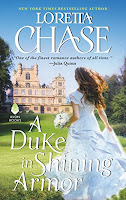
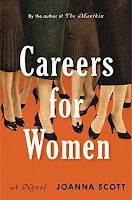
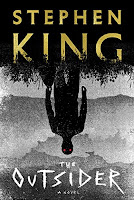
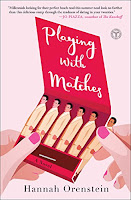

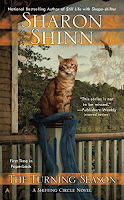
0 comments:
Post a Comment